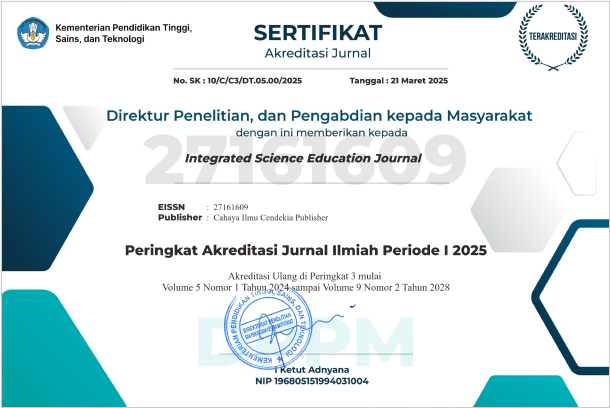The Development of Electronic Students’ Worksheets (E-LKPD) Based on Argument Driven Inquiry Learning Model to Improve Scientific Argumentation Skills
Abstract
Purpose of the study: This research aims to develop electronic student worksheets (E-LKPD) based on the Argument Driven Inquiry (ADI) Model to enhance the scientific argumentation skills of high school students. The impetus for innovative educational tools is intensified by ongoing industrial and social revolutions, necessitating advanced human resource capabilities.
Methodology: Research and development, the study encompasses the stages of analysis, design, development, implementation, and evaluation. The subjects were 29 Class XI IPA students. Data analysis utilized descriptive statistics and paired sample t-tests to assess the effectiveness of the E-LKPD in improving students' argumentation skills.
Main findings: Validation results from material and media experts indicated that the E-LKPD is highly feasible. Furthermore, responses from science teachers and student trials in one-on-one, small, and large group settings rated the E-LKPD in the "very good" category. A notable finding was the significant improvement in students' argumentation skills when using the E-LKPD, as evidenced by the paired sample t-tests.
Novelty/Originality of this study: The originality of this study lies in its application of the ADI model to E-LKPD, tailored to meet the demands of the industrial and social revolutions by fostering an entrepreneurial mindset in students. This research underscores the critical need for educational innovation, particularly in integrating entrepreneurship-based learning videos in junior high schools. By instilling an entrepreneurial spirit, students are better equipped to navigate and compete in the contemporary landscape, making this study a pivotal contribution to educational practices and resource development.
References
R. M. Probosari, M. H. Ramli, M. Indrowati, and Sajidan, “Profil keterampilan argumentasi ilmiah mahasiswa pendidikan biologi fkip uns pada mata kuliah anatomi tumbuhan [Profile of scientific argumentation skills of fkip uns biology education students in the plant anatomy course],” Jurnal Bioedukasi, vol, 9, no. 1, 2016, doi: 10.20961/bioedukasi-uns.v9i1.3880.
E. W. Roviati and A., “Kontribusi argumentasi ilmiah dalam pengembangan keterampilan berfikir kritis [The contribution of scientific argumentation in the development of critical thinking skills],” J. Ilm. Multi Sci., vol. 11, no. 2, pp. 56–66, 2019, doi: 10.30599/jti.v11i2.454.
A. N. Muna and Rusmini, “Pengembangan lember kerja peserta didik untuk melatihkan keterampilan argumentasi ilmiah peserta didik pada materi laju reaksi [Developing student worksheets to practice students' scientific argumentation skills on reaction rate material],” J. Chem. Educ., vol. 10, no. 2, pp. 159–171, 2021, doi: 10.26740/ujced.v10n2.p159-171.
N. D. C. Devi, E. Susanti, N. Indriyanti, and Y., “Analisis kemampuan argumentasi siswa sma pada materi larutan penyangga [Analysis of high school students' argumentation abilities on buffer solution material],” J. Kim. dan Pendidik. Kim., vol. 3, no. 3, pp. 152–159, 2018, doi: 10.20961/jkpk.v3i3.23308.
A. W. R. Akili, L. A., and L. A. R. Laliyo, “Pengembangan perangkat pembelajaran larutan elektrolit berbasis model argument driven inquiry untuk melatih keterampilan argumentasi ilmiah siswa sma [Development of an electrolyte solution learning tool based on the argument driven inquiry model to train high school students' scientific argumentation skills],” J. Inov. Pendidik. Kim., vol. 16, no. 1, pp. 22–29, 2022, doi: 10.15294/jipk.v16i1.28996.
Y. Herlanti, Pemanfaatan Media Sosial pada Pembelajaran Sains berbasis Isu Sosiosaintifik untuk Mengambangkan Keterampilan Berargumentasi dan Literasi Siswa [Utilization of Social Media in Science Learning based on Socioscientific Issues to Develop Students' Argumentation and Literacy Skills]. Bandung: Sekolah Pascasarjana Universitas Pendidikan Indonesia, 2014.
Y. Andriani and R. Riandi, “Peningkatan penguasaan konsep siswa melalui pembelajaran argument driven inquiry pada pembelajaran ipa terpadu di smp kelas vii [Increasing students' mastery of concepts through argument driven inquiry learning in integrated science learning in class VII junior high school],” EDUSAINS, vol. 7, no. 2, pp. 114–120, 2015, doi: 10.15408/es.v7i2.1578.
A. Irvan and S. Admoko, “Analisis kemampuan argumentasi ilmiah siswa berbasis pola toulmin’s argument pattern (tap) menggunakan model argument driven inquiry dan diskusi pada pembelajaran fisika sma [Analysis of students' scientific argumentation abilities based on Toulmin's argument pattern (tap) using the argument driven inquiry and discussion model in high school physics learning],” Inov. Pendidik. Fis., vol. 9, no. 3, pp. 318–325, 2020, doi: 10.26740/ipf.v9n3.p318-324.
A. Novitasari., M. H. Z., D. L. Lentika, D. R. Maghfiroh, and S. Atmoko, “Pengembangan lkpd model pembelajaran argument driven inquiry untuk meningkatkan keterampilan literasi sains siswa [Development of LKPD argument driven inquiry learning model to improve students' scientific literacy skills],” ORBITA J. Has. Kajian, Inov. dan Apl. Fis., vol. 8, no. 1, p. 7, 2022, doi: 10.31764/orbita.v8i1.8412.
A. R. P. Leba, “Pengembangan lembar kerja peserta didik (LKPD) Materi Biologi Berbasis Inkuiri Terbimbing untuk Siswa SMA Kelas X Semester 2 [Development of student worksheets (LKPD) on Guided Inquiry-Based Biology Material for Class X Semester 2 High School Students],” in Jurusan Pendidikan Matematika dan Ilmu Pengetahuan Alam Fakultas Keguruan dan Ilmu Pendidikan Universitas Sanata Dharma Yogyakarta, Yogyakarta: Universitas Sanata Dharma Yogyakarta, 2021, pp. 24–25.
A. K. J. K. Rochman and Yuliani, “Pengembangan lembar kerja peserta didik elektronik (e-lkpd) berbasis inkuiri pada submateri fotosintesis untuk meningkatkan kemmpuan argumentasi peserta didik [Development of inquiry-based electronic student worksheets (e-LKPD) on photosynthesis sub-materials to improve students' argumentative abilities],” Berk. Ilm. Pendidik. Biol., vol. 10, no. 3, pp. 663–667, 2021, doi: 10.26740/bioedu.v10n3.p663-673.
I. Yulia, Connie, and E. Risdianto, “Pengembangan lkpd berbasis inquiry berbantuan simulasi phet untuk meningkatkan penguasaan konsep gelombang cahaya di kelas xi mipa sman 2 Kota Bengkulu [Development of inquiry-based LKPD assisted by PHET simulations to improve mastery of the concept of light waves in class Xi MIPA SMA 2 Bengkulu City],” J. Kumparan Fis., vol. L1, no. 3, p. 7, 2018, doi: 10.33369/jkf.1.3.64-70.
Y. Yusnidar, E. Epinur, and N. A. Nadila, “Analysis of Student Responses to Student Worksheets Based on Project Based Learning Models,” In. Sci. Ed. J, vol. 4, no. 3, pp. 111-116, 2023, doi: 10.37251/isej.v4i3.718.
F. M. Mardiana and N. Y. Ningsih, “Cooperative Learning Model on Atomic Structure Material and It’s Influence on the Scientific Attitude of Class X Students at Senior High School,” In. Sci. Ed. J, vol. 4, no. 1, pp. 23-29, 2023, doi: 10.37251/isej.v4i1.273.
E. Romiyati, A. Ardi Rahman, and E. Budiyono, “Development of Mathematical Student Worksheets Based on Scientific Approaches and PQ4R Learning Strategies on Associated Materials”, Jor. Eva. Edu, vol. 4, no. 1, pp. 17-20, 2023, doi: 10.37251/jee.v4i1.296.
M. Maria, S. Silalahi, Y. Aggarwal, and U. Galadima, “Implementation of Science Student Work Sheet Based on Multiple Intelligence Materials Temperature and Their Changes”, Jor. Eva. Edu, vol. 4, no. 3, pp. 104-109, 2023, doi: 10.37251/jee.v4i3.698.
U. Pratiwi, Mudah Belajar Design Grafis dengan Aplikasi Canva [Easy to Learn Graphic Design with the Canva Application]. Yogyakarta: Diva Press, 2021.
Sugiyono, Metode Penelitian Pendidikan (Pendekatan Kualitatif, Kuantitatif, R&D) [Educational Research Methods (Qualitative, Quantitative, R&D Approaches]. Bandung: Alfabeta, 2018
W. W. Lee and D. L. Owens, Multimedia-Based Instructional Design [Multimedia-Based Instructional Design]. San Francisco: Pfeiffer, 2004.
R. Rusdi, Penelitian Desain dan Pengembangan Kependidikan [Educational Design and Development Research]. Depok: Rajawali Pers, 2018.
S. E. Toulmin, The uses of argument, Cambridge university press, 2003.
R. Hake and R., Change/Gain Scores.AREA-D American Education Research Association’s Devision.D, Measurement and Reasearch Methodology, 1999.
N. Hasnunidah, H. Susilo, M. Irawati, and H. Suwono, “The contribution of argumentation and critical thinking skills on students’ concept understanding in different learning models,” Journal of University Teaching & Learning Practice, vol. 17, no. 1, 2020, doi: 10.53761/1.17.1.6.
I. L. L. Ping, L. Halim, and K. Osman, “Explicit Teaching of Scientific Argumentation as an Approach in Developing Argumentation Skills, Science Process Skills and Biology Understanding,” Journal of Baltic Science Education, vol. 19, no. 2, pp. 276-288, 2020, doi: 10.33225/jbse/20.19.276.
O. Sengul, P. J. Enderle, and R. S. Schwartz, “Science teachers’ use of argumentation instructional model: linking PCK of argumentation, epistemological beliefs, and practice,” International Journal of Science Education, vol. 42, no, 7, pp. 1068-1086, 2020, doi: 10.1080/09500693.2020.1748250.
G. Zhao, R. Zhao, X. Li, Y. Duan, and T. Long, “Are preservice science teachers (PSTs) prepared for teaching argumentation? Evidence from a university teacher preparation program in China,” Research in Science & Technological Education, vol. 41, no. 1, pp. 170-189, 2023, doi: 10.1080/02635143.2021.1872518.
W. J. Howitz, T. Frey, S. J. Saluga, M. Nguyen, K. Denaro, and K. D. Edwards, “A specifications-graded, sports drink-themed general chemistry laboratory course using an argument-driven inquiry approach,” Journal of Chemical Education, vol. 100, no. 2, pp. 672-680, 2023, doi: 10.1021/acs.jchemed.3c00433.
T. Demircioglu, M. Karakus, and S. Ucar, “Developing students’ critical thinking skills and argumentation abilities through augmented reality–based argumentation activities in science classes,” Science & Education, vol. 32, no. 4, pp. 1165-1195, 2023, doi: 10.1080/02635143.2021.1872518.
V. Sampson, “Argument-Driven Inquiry in Undergraduate Chemistry Labs: The Impact On Students Conceptual Understanding, Argumen Skills, And Attitude Towards,” J. Coll. Sci. Teach. Sci., pp. 1–9, 2012.
Seixas Mello, P., Cotta Natale, C., Marzin-Janvier, P., Vieira, L. Q., & Manzoni-de-Almeida, D. (2023). Inquiry-based learning in immunology: Analysis of scientific argument construction by undergraduate students in biological science and health care classes. Journal of Biological Education, vol. 57, no. 1, pp. 68-82, 2023, doi: 10.1080/00219266.2021.1877778.
Copyright (c) 2024 Suri Margi Utami, Haryanto Haryanto, Agus Subagyo

This work is licensed under a Creative Commons Attribution 4.0 International License.
Authors who publish with this journal agree to the following terms:
- Authors retain copyright and acknowledge that the Integrated Science Education Journal is the first publisher licensed under a Creative Commons Attribution 4.0 International License.
- Authors are able to enter into separate, additional contractual arrangements for the non-exclusive distribution of the journal's published version of the work (e.g., post it to an institutional repository or publish it in a book), with an acknowledgment of its initial publication in this journal.
- Authors are permitted and encouraged to post their work online (e.g., in institutional repositories or on their website) prior to and during the submission process, as it can lead to productive exchanges and earlier and greater citation of published work.







.png)
.png)






